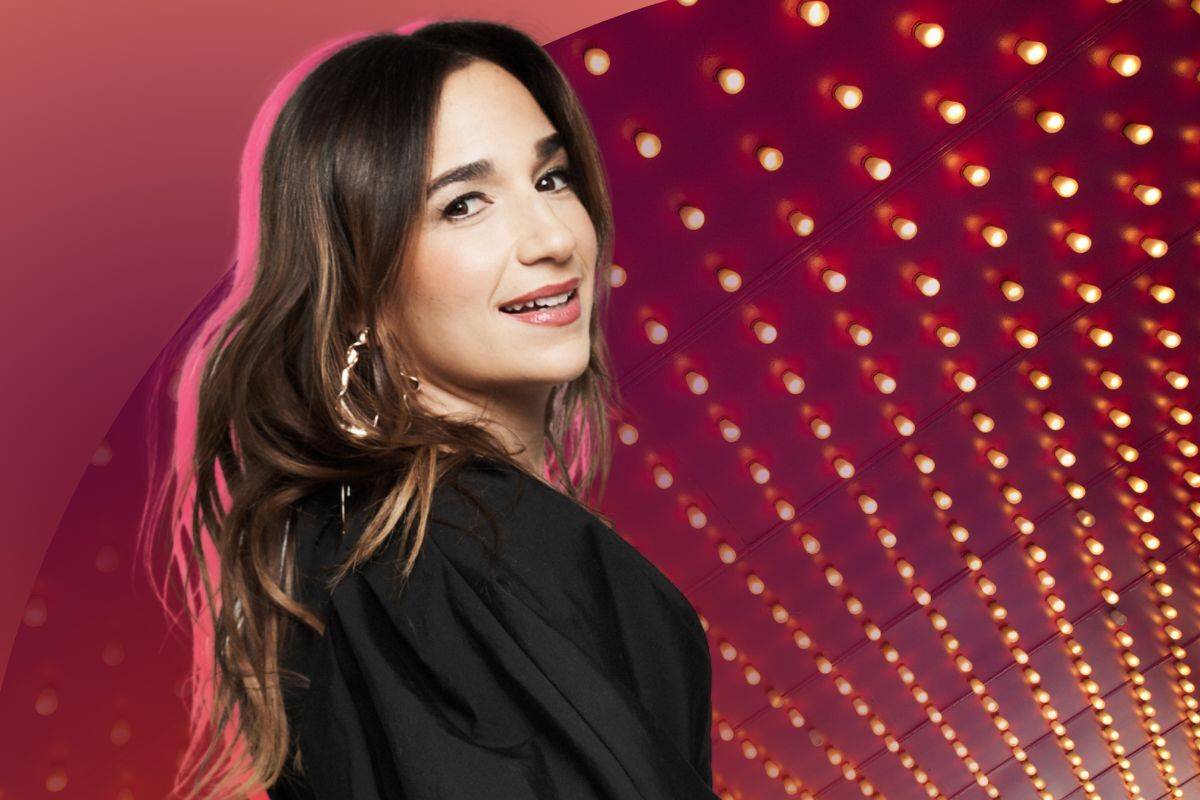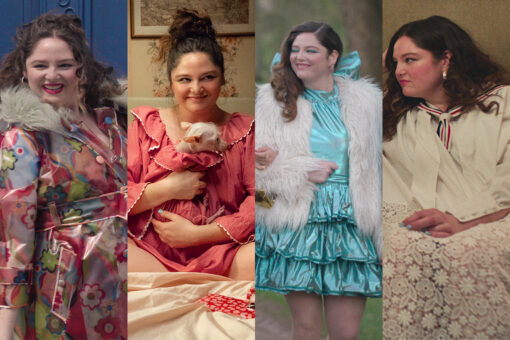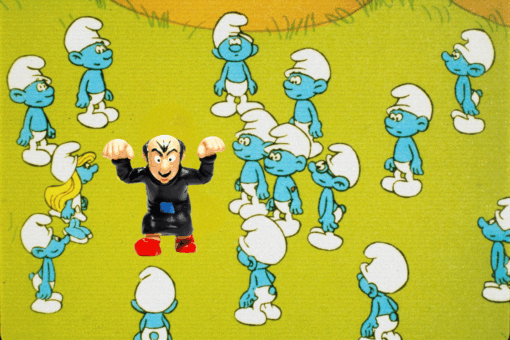“Which Way to the Stage,” now playing off-Broadway at the Robert Wilson MCC Theater Space, opens with a scene very familiar to Broadway fans. Two friends, Jeff and Judy, wait nervously outside a stage door, wondering aloud what the chances are that the star of “If/Then,” Idina Menzel, will emerge that night to sign playbills. Their rapid fire conversation about everything from Menzel to Streisand to the current state of their romantic lives is interrupted when it starts to rain, dashing their hopes of meeting Menzel for the evening.
What starts as an ode to hard-core theater fandom quickly becomes a thoughtful examination on gender and performance. Judy and Jeff are obsessed with Idina Menzel not only because she’s a legendary talent, but because she still feels “real.” What that “realness” signifies to Jeff and Judy becomes a major source of tension between the two friends. Judy sees in Menzel the kind of confidence and femininity she struggles with, to the detriment of her love life and never-quite-realized acting career. Jeff regularly performs as a drag queen and has a much easier time accessing that kind of feminine performance that eludes Judy, but he is frustrated by the limited spaces where that kind of performance is valued from a gay man. This tension between the two of them is brought to a head over the course of the play, threatening to tear their friendship apart.
I was struck at once by a sense of recognition. Not just for the hardcore theater nerdiness and Idina Menzel love, but by Judy herself, and the way her frustrations were brought to life in such an authentic and distinctly Jewish way by actor and writer Sas Goldberg.
Goldberg knows her way around funny Jewish women. Her performing credits include a Broadway debut in Josh Harmon’s very Jewish play “Significant Other,” Bravo’s “Odd Mom Out,” and most recently in Amy Schumer’s deeply personal and dark comedy, “Life & Beth.” In addition to appearing in “The Shrink Next Door,” she was a writer and producer on the series. She was also a writer on one of the best pieces of Jewish content to come out of the pandemic, “Saturday Night Seder,” and is a writing on the forthcoming final season of “The Marvelous Mrs. Maisel.” I had the great privilege to catch Sas on Zoom between performances to chat about Broadway, funny Jews, and returning, literally, to the Lower East Side.
This conversation has been lightly edited and condensed for clarity.
How did you end up being involved in the show?
Ana, the playwright is a dear friend. I was at a brunch with her and another friend of ours, Jake Wilson. We were coming up with faux titles of plays. I think Jake came up with this one, and when he did Ana went very quiet. Then she said, “I know what that play is about,” and soft pitched it. It was 2015 at the time, so I think “If/Then” was still playing. At the time we were like, “oh, lol, funny game” but then six months later, she had actually written that play. So I’ve been involved with it from the very, very beginning, from the inception at the brunch and the lightbulb idea.
What has the response to the show been like so far?
It’s been overwhelmingly warm and positive. It speaks to theater people. I think being a theatre person is something very unique. It’s very special. You can feel very “other” in during childhood until you find your people. And so I think to have a play for us is really special and unique. I’m so happy to be part of a play that’s about those exact people.
One question the show digs into is portrayals of women on stage and the line between something being kind of funny or empowering, and something just being hurtful and misogynistic. It’s something that Judy really struggles with as an actor. As a woman in the industry who has worn a number of different hats, how do you navigate that line and the projects you take on?
I’ve always felt that my humor has been my superpower. I like people making fun of me. I like being laughed at. I like being laughed with. I’ve always liked that. I’m so thrilled to be part of a show like this, where we’re exploring different ways of femininity, and what that looks like. It doesn’t have to look the way we’ve all thought it should look this entire time.
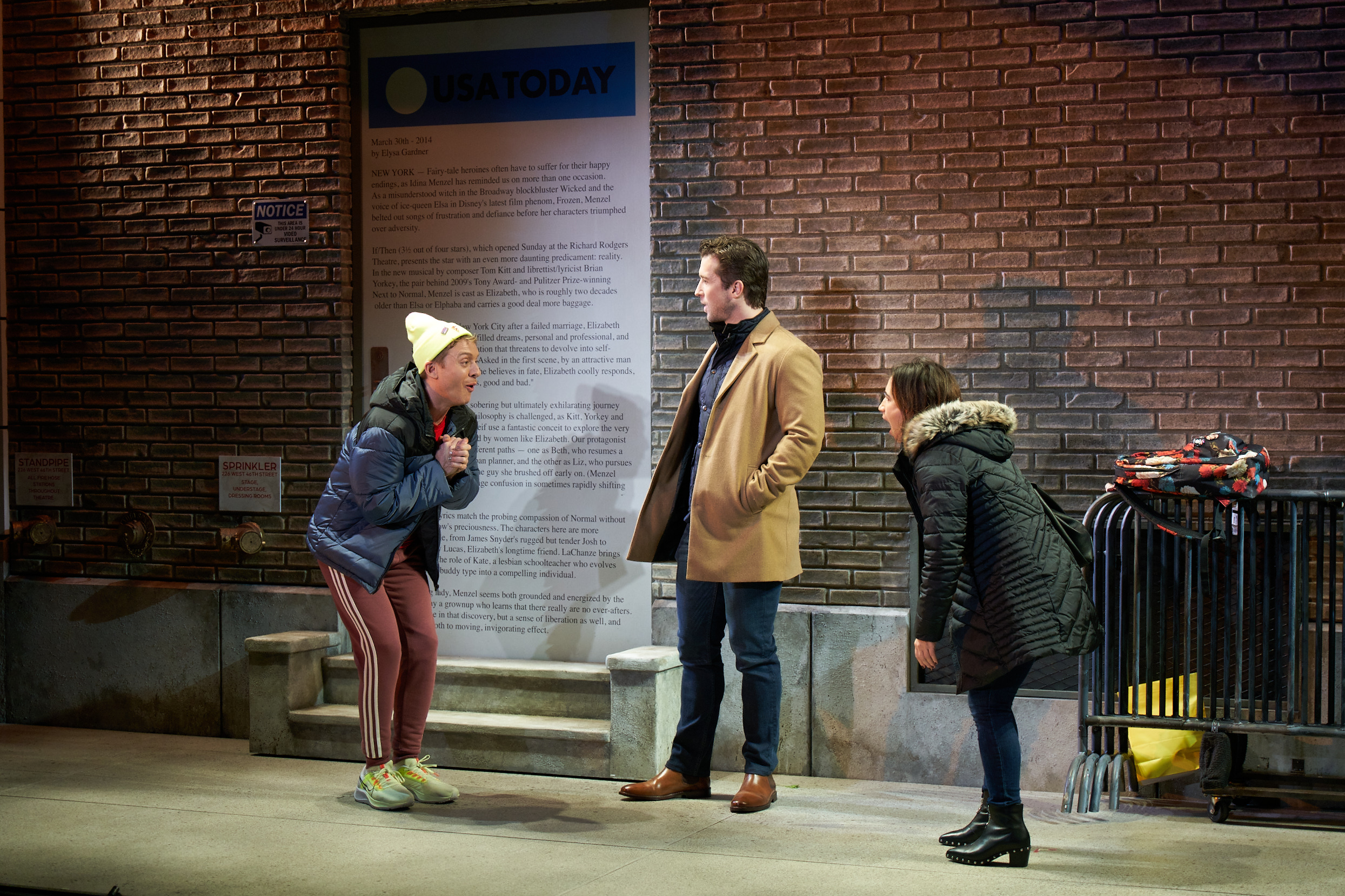
As you mentioned before, this show is about stage-dooring. Is there a Broadway show, from any point in history, would you be willing to spend weeks waiting at the stage-door?
I have done it. “Bat Boy: The Musical,” which was at the Union Square theatre. I was obsessed with that show. I think part of the joy of stage-dooring is knowing about something before other people know about it, or feeling like you’ve discovered something. That feeling of “oh, the world doesn’t know about this yet.” I imagine that was kind of how people felt seeing “Rent” at New York Theatre Workshop, or “Hamilton” at The Public. But yeah, I saw “Bat Boy” 12 times. I was absolutely obsessed.
You were also recently in the show “Life & Beth,” where you played Jess, a friend of Beth, played by Amy Schumer, who is dealing with a sudden loss and returning to key moments in her childhood. What was it like working on that project?
Oh my god, dream project. To be able to shoot in New York City was incredible. Amy was a dream. The cast was a dream, the crew was a dream. I’ve been very grateful for this past year or so of work. Amy was able to create a show tonally that I hadn’t seen before, and it shows a part of herself that we haven’t seen before.
Something “Life & Beth” and “Which Way To The Stage,” had in common was the way they were about women who were struggling with feeling that they were not where they thought they would be at this stage in their life. Are you where you thought you’d be?
Oh god, great question. No, but not in a disappointing way. I’m a mother of two kids, and while I used to think of myself as an actress, now I kind of think myself as a writer/actress. I’m so grateful for where I am, but it doesn’t look necessarily how I thought it was going to look. I always thought I would have children, but I never really considered what that would look like, or how I would do what I do with kids. So kind of finding that footing has been very illuminating. And I’m still finding it. It’s quite messy.
What role did Judaism play in your upbringing?
I am so happy to talk about it. I had a bat mitzvah and we celebrated the High Holidays, but I was more culturally Jewish. I was really embarrassed to be Jewish, my entire adolescence. I would cringe saying my last name, Goldberg. When I first started auditioning professionally I went by Salinger, which is not even a family name. I wanted to remove any sort of Judaism from me. Kind of hard to do, I realize now. But at the time, I thought I could fool them.
College was a particularly defining moment, where I started to realize that Judaism is part of what makes me unique. It’s part of my humor, my culture. I feel so proud to be Jewish. And that completely shifted. I wish I could have talked to young Sas at 11 or 12, and tell her, you’re going to actually love that your last name is Goldberg someday, you’re going to be really proud of it.
And how do you define Jewish humor?
Self-deprecating, sharp. A little fresh and cutting, but kind.
As both an actor and a writer, you’ve ended up working on a lot of very Jewish projects, from “The Shrink Next Door,” to the upcoming season of “The Marvelous Mrs. Maisel,” to “Saturday Night Seder.” Have you been seeking out Jewish projects, or do they find their way to you?
I think it’s both. As a writer, I try to write what I know. And this is part this is what I know. And I am very interested in bringing Jewish female voices to television and to the screen, not acting in it necessarily, but writing those type of stories.
What to you is good Jewish representation in storytelling?
There’s a part of being Jewish that you can’t necessarily perform, that you just are. I’ve always said my Judaism does not come from the Torah, or something that’s happened in synagogue. It comes from whitefish, from bagels, from arguing with my family about, I don’t know, the thermostat. That’s a lot of where my Judaism is. And that is something you can’t really fabricate. I don’t think every story needs it. But I think there are certain stories and certain people where Judaism has been a central part of who they are and how they operate. And it is important to get those moments right.
What’s your favorite thing about being Jewish?
The familial pull. The fact that – at least in my experience –there’s not many things that are off-limits. It’s so funny. When I had my first daughter, it was truly like a clown car of people coming in and out of the hospital. There were always people there. And then a friend of mine who was not Jewish, she had a baby, and when I came to the hospital, she was like, “You’re our first visitor!” And I was like, “What, really?” There’s not many boundaries in Jewish families. And it’s a part of us that could drive you crazy, but it’s also the part that I love.
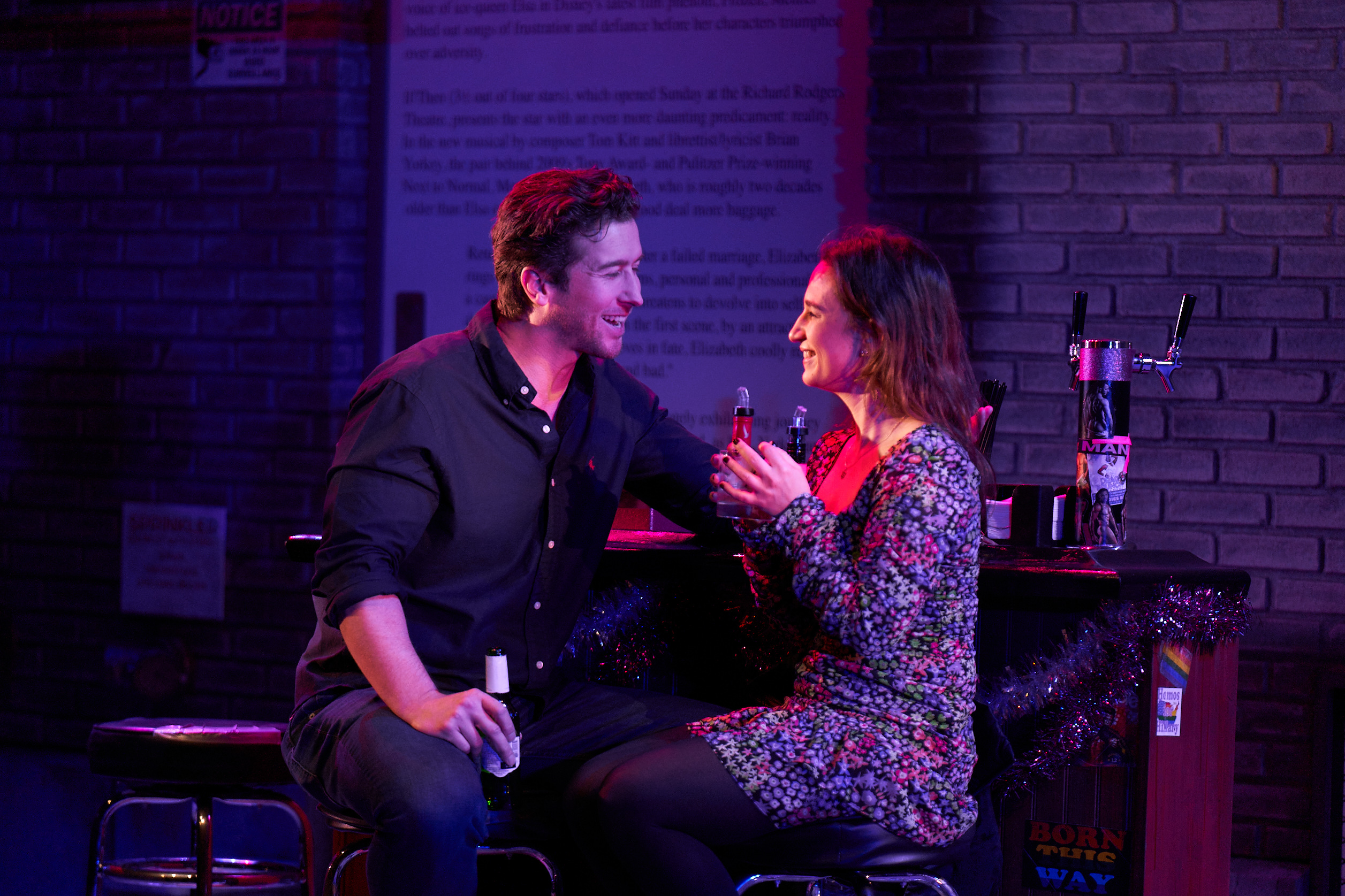
“Which Way To The Stage” was extended through May 28th. How is it being back on stage?
Oh, it’s really thrilling. I’ve been waiting to do this play for a really long time. We were originally slated to do it in 2020. Obviously, things took a turn, the world changed. And so I feel really grateful that we got an opportunity to do it again. I’m working with a lot of people who are also really close friends. It feels like lightning in a bottle. I’m trying to capture it as much as possible.
What’s next for after you?
I’m going to turn back to writing for a little bit. I have a few things in development that I’m working on, and I’m excited to put on that hat, which I haven’t worn in a little bit. And then hopefully, some more acting opportunities coming down the pipeline.
Is there anything else you want to talk about?
This is very random, but I own a neon company, Name Glo. I make neon signs.
That is very cool. How’d you get into that?
So I have a cofounder, her name is Lena Imamura. She’s amazing. I wanted a neon sign for my nephew when he was born, and at the time very few options came up. It was like all things that felt like 1977. Every time I called I always speak like an older man, and I didn’t think they were totally getting my vibe. I also wanted somebody to talk to me, and really walk me through how it worked. Do I plug it in? Is it battery operated? Is it safe? How much does it cost? I had no concept and so I wanted somebody to do like, “Neon for Dummies” and talk me through it. Lena is a visual artist, so I wrote her, being like, “ever do this? I don’t know if this is a possibility.” And she was like, “no problem.” At the time I was working on the Upper East Side teaching acting to kids, and I realized I there was a lot of moms who might want something similar. That was 2014, and we launched Name Glo in 2016. Now we have a full storefront and fabrication studio on the Lower East Side. I think my Jewish ancestors would be very tickled by the idea that we’re on Norfork and Rivington making things, just getting back to basics, going back to my roots.
